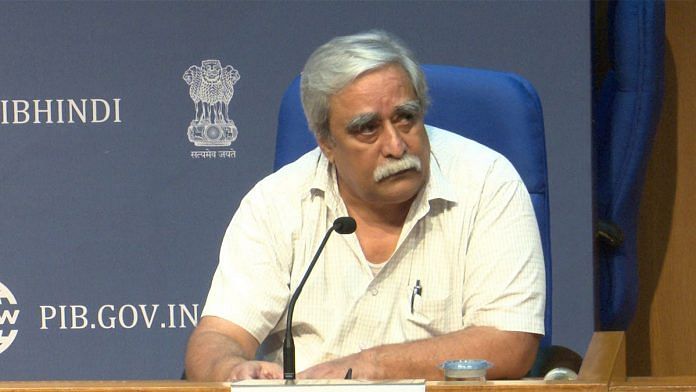New Delhi: The growing use of plasma and remdesivir will lead to the SARS CoV2 virus mutating, and as a result, becoming stronger, former ICMR scientist Dr Raman Gangakhedkar said.
The epidemiologist, who was the face of the Indian Council of Medical Research (ICMR) during government briefings on Covid-19 last year, told ThePrint that the indiscriminate use of treatments, which have failed to prove effective in different stages of Covid-19, “can help the SARS CoV2 virus mutate further and become stronger”.
“While on one side, the body’s own immune system puts pressure on the virus to mutate, using ill-timed treatment options, such as remdesivir in mild disease and plasma in moderate to severe, can make the virus become stronger,” he said.
“The government should clearly communicate with doctors and hospitals to stop or rationalise the ongoing use of convalescent plasma and antiviral drug remdesivir,” added Gangakhedkar, who retired from ICMR in June last year but is part of the apex medical body’s meeting to discuss the use of plasma, which is slated to take place Wednesday.
According to him, India can also be a cause of concern for other countries due to the possibility of harbouring a number of mutants.
“With a large number of Indians exposed to the virus followed by the use of these treatment options on them, the chances of developing mutations, which may be of high significance and evade vaccine-induced immune protection, become high,” he warned.
“We could become a breeding ground for several mutants during this rapidly spreading wave if we do not adhere to evidence-based treatments.”
Not only Dr Gangakhedkar, several other clinicians, public health professionals, and scientists from across the country have been raising concerns over the “irrational and non-scientific use of convalescent plasma” to treat Covid-19.
On 11 May, these experts, in a letter to Professor K. Vijay Raghavan, principal scientific advisor to the Government of India and Dr Balram Bhargava, director general of ICMR, said ICMR guidelines on plasma treatment were not based on existing evidence.
“Convalescent plasma is a very old method used as a first attempt to fight any new disease when you know nothing about a deadly infectious disease,” Dr Gangakhedkar said. “Also, in India, we are injudiciously using the plasma which should not be given after the seventh day of Covid-19 illness.”
Also read: Sputnik V arrived 1 May to boost India’s vaccine drive, but is still ‘stuck’ in lab for tests
Ineffective therapies lead to mutations
Dr Gangakhedkar, who was involved in the prevention and control strategies against the HIV epidemic in India, said viruses are very “smart” microorganisms that keep mutating.
Viruses can only mutate in the body of the hosts (in this case humans), he explained while adding that once the host dies, it’s the end of life for the virus as well.
“These viruses have error-prone reproductive enzymes and hence they develop mutations,” he said. “The more times the virus replicates, whether through a longer survival in an immunosuppressed individual or by quickly infecting other individuals during a wave, the more is the opportunity to mutate and accumulate these mutations.”
According to the doctor, while not all mutations are likely to be harmful to human beings, the more “we challenge the virus through the selective pressure of ineffective or irrational use of antivirals or immune pressure through plasma, it will recognise the pattern and will try to change to evade those therapies”.
“Eventually, it may become a better and fit virus,” he said.
For instance, he explained, antivirals attack the enzymes involved in the replication.
“A drug like remdesivir is known to attack one of those enzymes, not all. This will give the virus a chance to try and produce a progeny with mutation where the drug is attacking,” he said.
Dr Gangakhedkar quoted the study conducted by Dr Ravi Gupta of Cambridge University. The study found that the rapid development of mutations was four times more when a patient received convalescent plasma in the late stages of the disease.
Gangakhedkar suspects that a similar pattern may be visible with remdesivir as well. “We may have to wait for understanding about the selection pressure exerted by antivirals…, ” he said.
Confusion over plasma, remdesivir use
Gangakhedkar believes that the right communication from the government will save relatives the pain of looking for these therapies.
“Plasma is not for moderate to severe disease whereas remdesivir, which may reduce hospitalisation by a few days if given during moderate to severe disease, is not advised for mild disease,” he said. “However, there is confusion and people are desperately searching for these therapies on social media channels for every patient.
“We must think about those relatives who are running for these drugs from here to there thinking it will save their loved ones life,” the doctor added. “They have no idea that these therapies are ineffective in certain disease stages.”
The lack of clarity on treatment, Dr Gangakhedkar said, has other repercussions.
“If they (relatives) fail to find the therapies and their loved ones die, these people will keep nurturing a guilt for a lifetime that they were unable to find plasma or remdesivir,” he said.
(Edited by Arun Prashanth)
Also read: Doctors red-flag rising fungal infection cases in Covid patients, warn against steroid overuse



